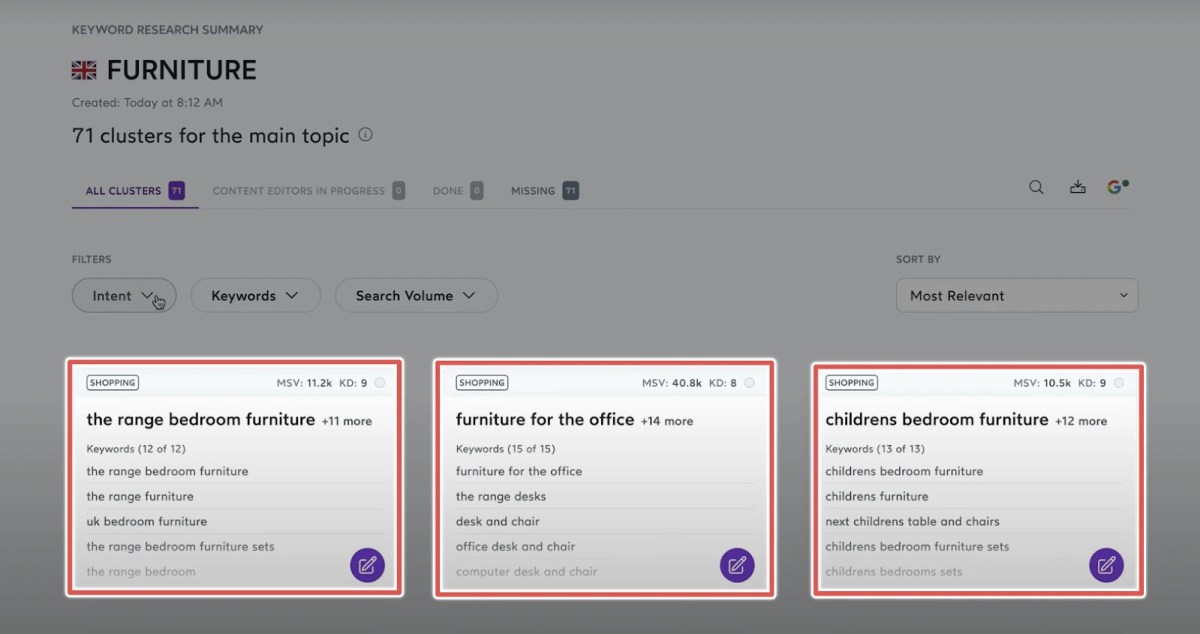| Tools | Key Features | Pricing |
|---|---|---|
| 1. Keyword Insights | ✓ Generate AI-driven keywords ✓ Customizable clustering settings ✓ SERP Explorer & SERP Similarity ✓ AI-driven content briefs | $58 – $299/month 20% discount on annual billings |
| 2. Semrush | ✓ Automated keyword clustering ✓ Cluster competitor’s keywords ✓ Content optimization features ✓ Real-time SERP analysis | $129.95 – $499.95/month 17% discount on annual billings |
| 3. SE Ranking | ✓ Flexible clustering accuracy settings ✓ Detailed cluster analysis ✓ SERP-based grouping ✓ Keyword clustering customization | $55 – $239/month Additional cost for queries |
| 4. Surfer SEO | ✓ No need to upload keyword lists ✓ Topic cluster visualization ✓ Content creation integration ✓ Built-in content optimization tool | $89 – $299/month Up to $600 off on annual billing |
| 5. ClusterAi | ✓ SERP-based grouping ✓ Integration with Semrush & Ahrefs ✓ Integration with Google Search Console ✓ Agglomerative algorithm | $39 – $699/month |
| 6. SEO Scout | ✓ Fast keyword grouping ✓ Fast analysis and clustering ✓ Export results as a spreadsheet ✓ Free tool | Free |
Most SEOs still do keyword clustering the old way—(the manual way).
Here’s the typical process they follow :
- They start by generating a list of keywords using tools like Ahrefs and Semrush.
- Next, they create a spreadsheet to organize these keywords.
- They manually analyze each keyword on the search engine results pages (SERP) to sort them based on search intent.
- Afterward, they manually scrutinize these grouped keywords to identify potential content topics, SEO strategies, or areas for optimization.
However, there are several issues with this method:
- It’s incredibly time-consuming.
- It lacks data-driven insights that could uncover hidden content gaps and opportunities.
- It’s not suitable for handling large keyword lists.
So, how can you perform keyword clustering in a more efficient, data-driven, and scalable way?
Enter keyword grouping tools.
But before delving into our comprehensive list of the best keyword clustering tools, let’s first gain a clear understanding of what keyword clustering entails, explore its benefits, and learn how these keyword grouping tools work.
Shall we?
What Is Keyword Clustering?
Keyword clustering is an SEO practice that involves grouping similar keywords based on shared search intent and semantic meaning.
This approach enables you to create content that targets multiple related search queries rather than focusing on optimizing it for one keyword.
The concept behind keyword grouping is that a page optimized for a particular cluster can rank for a large number of keywords which can signal the search engines about the topic depth and coverage.
What Are the Advantages of Keyword Clustering?
Keyword grouping is important for SEO because often users employ different search phrases to find the same content.
By identifying all relevant terms associated with your content, you can optimize your content to encompass a broader spectrum of keywords which can improve your topic coverage, and content quality and in turn, boost your ranking.
Here are several keyword clustering benefits:
1. Rank for Multiple Keywords
One huge advantage of keyword clustering is that you can create a single piece of content and rank for multiple keywords boosting your organic traffic.
The fact is most content pieces don’t rank for a single keyword.
For example:
If we plug a single page url and run it through a competitive research tool like SE Ranking say for example this URL from ClickUp:

We can see that it ranks for over 674 keywords.

In the case of ClickUp, their “best project management software” page ranks for over 600 keywords.
This broader coverage attracts a substantial amount of organic traffic from various search queries, ultimately boosting their website’s visibility and reach.
2. Streamline Content Research and Ideation
Keyword clustering helps you organize and structure your content ideas more efficiently by grouping related keywords together.
By clustering keywords, you can quickly see which topics have a lot of related keywords and which ones are underrepresented. This allows you to identify content gaps and areas where you can create new, valuable content.
3. Prevent Keyword Cannibalization
Keyword cannibalization occurs when multiple pages on your website compete for the same keyword, causing confusion for search engines.
Through keyword clustering, you can group related keywords based on relevance and search intent and map them to a single page instead of creating individual pages for each keyword
4. Boost Topical Authority
With keyword clustering, your web pages support and complement each other within clusters.
Over time, this coherent structure establishes your website as an authoritative source on relevant topics.
Google takes notice of this authority, which can lead to higher rankings and more visibility in SERPs.
5. Improve Internal Linking
Keyword clustering naturally facilitates internal linking. All cluster pages can link to the pillar page, enhancing user navigation and signaling content relevance thereby boosting the SEO performance of your website.
How Does Keyword Grouping Software Work?
Keyword grouping software, also known as keyword clustering tools, is a piece of software that uses algorithms and data analysis to group keywords based on search intent and semantic relevance.
Here’s how a keyword clustering works:
Upon entering your list of keywords into the tool, it analyzes to identify relationships and similarities among them.
The software employs various algorithms, including centroid and agglomerative clustering algorithms, to gain insights about each keyword and group them based on context, intent, and relevance.
After that the software then presents the keyword groups in an organized and visual format, such as a table or a mind map, making it easier for users to understand the structure of their keyword research.
Best Keyword Grouping Software
A keyword clustering software allows you to automate the process of grouping related keywords together based on their shared search intent and semantic relevance.
Using these tools you can analyze large sets of keywords and identify patterns or similarities among them to create clusters or groups.
In this section we’ll review the best keyword clustering tools and show you how they stack up in terms of:
- Ease of use
- Pricing
- Features and functionalities
Let’s delve in.
1. Keyword Insights

Keyword Insights topped our list of the best keyword clustering tools and for a good reason. The keyword grouping software leverages the power of AI to help you generate keyword ideas, group them into clusters, and even create or optimize your content around those clusters.
Unlike many clustering tools that rely heavily on Natural Language Processing (NLP), Keyword Insights takes a different approach.
It uses live, country-specific SERP data for each query to check what’s ranking on Google and groups the keywords based on shared URLs.
This method, with a customizable 30% URL overlap threshold, provides more precise results than NLP alone, which can sometimes produce less accurate clusters.
Moreover, Keyword Insights provides you flexibility in clustering settings. You can fine-tune the tool by adjusting the URL overlap, selecting from two clustering algorithms (centroid and agglomerative), and controlling the strictness of the algorithm to form clusters.

This is a level of flexibility you’ll not find in most keyword grouping tools.
The keyword clustering tool also comes with other features including
- SERP Explorer: This free tool enables you to swiftly examine Search Engine Result Pages (SERPs) from various devices and locations, all without the need for a VPN.
- SERP Similarity: Easily compare the similarity between two keywords without the hassle of going through clustering processes.
- Keyword Discovery: Quickly input a seed keyword and generate thousands of related terms. This tool also provides their search volumes, keyword difficulty, and CPCs.
- Content Briefs: Harness the power of AI to craft content outlines. This tool scrapes data from the top 20 ranking pages for your chosen keyword and extracts information from sources like Reddit, Quora, and People Also Asked boxes. It then organizes this data to create comprehensive content briefs.
Keyword Insights Pricing

Keyword Insights offers a range of pricing plans to cater to various needs, from individual users to teams. Here’s a review of Keyword Insights pricing options:
- Basic – $58/month: Offers 6,000 credits per month and 1 user seat.
- Professional – $145/month: Offers 15,000 credits per month and 2 user seats.
- Premium – $299/month: Provides 45,000 credits per month and 5 user seats.
Keyword Insights also comes with a 4-day trial for $1. You also get a 20% discount on annual billings. What’s more, you can also opt for the pay-as-you-go pricing model where you pay 1000 credits for $15.98.
Pros
- Advance keyword clustering approach via NLP and SERP analysis
- Flexible pricing
- Customize clustering settings
- Keyword discovery features
- Upload up to a million keywords
- Create content briefs
Cons
- No free trial
- Keyword discovery could be better
- No Google search console integration
Conclusion
Keyword Insights provides the flexibility that most keyword grouping tools don’t. Notably, it allows you to select your clustering algorithm, location parameters, URL overlap settings, and strictness, which is truly impressive. Additionally, I was compelled by its advanced capabilities, including a content brief generator and the option to visualize clusters in both card and table formats.
2. Semrush Keyword Clustering

Semrush has long been known for its robust SEO platform that includes tools like keyword research, competitor research, backlink analysis, and site audit. (Read our Semrush review).
But recently, they upgraded its SEO stack including the Keyword Manager tool that allows you to create keyword clusters.
Semrush’s Keyword Manager excels in its ability to automate the keyword clustering process.
Users can initiate the clustering from scratch with just a few seed keywords or apply it to an existing keyword list.
Moreover, the SEO tools also allow them to cluster their competitor’s keywords.
You can plug in your competitor’s URL and the tool will identify keywords that your competitors are ranking for but not optimize, helping you target low-hanging fruit and potentially outrank them in those areas.
Once you cluster your keywords the tool will provide essential metrics for each keyword cluster, including total search volume, Keyword Difficulty (KD%), and search intent.
You also get the “high ranking potential” metric for particular clusters with low difficulty but significant search volume, which can lead to faster SEO results and improved rankings.

Rather than estimate the value of one keyword at a time, this lets you understand the value of each topic. From there you can decide to either send your selected cluster to:
- SEO Writing Assistant: for content creation and optimization.
- Position Tracking: you can monitor key metrics for individual keywords and keyword clusters and see if your keyword strategy works or not.
- PPC Keyword Tool: to monitor your paid campaigns

Semrush’s Keyword Manager also does a good job when it comes to keyword cluster visualization.
You can view your clusters either via mind map visualization:

Or via a table.

This enables you to identify central topics and subtopics, making it easier to structure content hierarchies and determine which keywords to target with pillar pages and supporting pages.
Semrush Pricing

Semrush doesn’t offer pricing flexibility if in case you want to only access the keyword clustering tool. In that case you need to pay for either of their plans which includes the following:
- Pro plan: costs $129.95 per month
- Guru plan: costs $249.95 per month
- Business plan: costs $499.95 per month
You also get a 17% discount if you choose annual billings.
Pros
- Visualize clusters in intuitive mind maps and table
- Great keyword research and discovery tools
- Stream content creation workflow with SEO writing assistant
- Real-time SERP analysis
- Multiple filters to customize your cluster to your needs
Cons
- It’s pricey
- Limited keyword clustering customization
- Limited to 2000 keyword upload
Conclusion
Semrush Keyword Manager is the best keyword clustering tool to discover competitor content gaps. Coupled with its excellent keyword research and competitor analysis tools the SEO tool allows you to discover valuable keywords that you can leverage to outrank your competitors.
3. SE Ranking’s Keyword Grouper

The Keyword Grouper is one of the outstanding features in the SE Ranking offering. Similar to Keyword Insights, it utilizes SERP data to group keywords that share a common search intent.
What makes Keyword Grouper particularly fascinating is its exceptional flexibility. You have the option to select the level of keyword grouping accuracy on a scale of 1 to 9. This scale typically represents the minimum number of URLs two keywords must have in common on the SERP to be categorized together. Additionally, you can configure the tool to conduct either a hard or soft analysis.

When it comes to inputting your keyword list into the tool, you have two choices: manual entry or uploading a CSV file. If you’re optimizing for a local business, you can further refine your clusters by specifying your country, location, and even language.
Once you’ve grouped your keywords, you can access detailed information on each cluster, including search volume, matches, and the top 10 ranking competitors.
Moreover, each cluster provides a list of highlighted keywords commonly found in search results, serving as valuable LSI keywords that can enhance your content for better SEO.
Following your analysis, you can either export the results as a CSV file for sharing with your team or clients, or you can incorporate the selected clusters into one of your projects.
SE Keyword Grouper Pricing

Although Keyword Grouper is an amazing keyword clustering tool, one thing that left me satisfied is their sleazily sly pricing criteria.
To begin with, you need to pay for the entire SE Ranking stack which costs between $55 – $239 per month to just get access to the Keyword Grouper tool.
On top of that, each query you make incurs a cost of $0.004, and there’s an additional charge of $0.005 for checking the search volume with every query. Frankly, if your intention is to solely utilize the Keyword Grouper tool, it may not prove to be a cost-effective solution for your business.
Pros
- Clean and intuitive user interface
- Ability to cluster non-English keywords
- Rank tracking feature
- Keyword clustering customization
Cons
- Expensive
- Limited cluster visualization
Conclusion
The Keyword Grouper is a perfect solution if you’re already using the SE Ranking SEO solution instead of using an external keyword grouping tool. The keyword clustering tool also offers exciting features such as the ability to analyze and cluster keywords based on location and language.
4. Surfer SEO’s Keyword Research Tool
Surfer SEO stands out as a popular tool for content research and optimization. Among its array of features is the Keyword Research function, which simplifies the process of discovering keyword and topic clusters.
What sets it apart from most keyword clustering tools is that you don’t have to upload your list of keywords for grouping. Simply input your seed keyword into its keyword research tool:

And the tool will then generate clusters based on the provided keyword, presenting them as individual tiles in a user-friendly format.

You can also filter the cluster results based on search intentt, search volume and keyword range per group allowing you narrow down your cluster to small relevent group.
In addition, Surfer SEO offers a streamlined content creation process. You can quickly add any of your clusters into the Content Editor, which harnesses the power of AI to facilitate content outlining, creation, and SEO optimization.

Surfer SEO Pricing

With Surfer SEO, you can access its keyword grouping feature across all its plans, granting you the ability to conduct 100 keyword searches each month.
To take advantage of this, you only need to subscribe to one of its paid plans, which start at $89 per month and scale up to $299 per month. Opting for the yearly payment plan also offers the opportunity to receive a discount of up to $600.
Pros
- Built-in content optimization tool
- Accurate clustering based on NLP and SERP analysis
- Integration with Google Docs and WordPress improving content creation workflow
- It’s very fast
Cons
- It’s keyword research tools could be better
- Cannot upload your keyword lists
Conclusion
The Surfer SEO Content Planner serves as an ideal solution if you’re seeking a quicker method for keyword clustering. Simply input your seed keyword, and the tool will generate highly accurate keyword clusters for you.
Moreover, the platform offers enticing features, including the Content Editor, which streamlines content optimization, and Surfer AI, enabling you to produce content briefs and complete articles with ease.
5. ClusterAi


ClusterAi is a semantic keyword clustering tool designed for grouping keywords based on shared search intent and semantic relationships. It employs an agglomerative algorithm, which enhances clustering accuracy. (Read out ClusterAi review).
Similar to its competitors, Keyword Insights and SE Ranking’s Keyword Grouper, ClusterAi utilizes SERP analysis to organize keywords into clusters. The tool identifies a keyword cluster as comprising three or more pages that rank and groups them accordingly.
However, unlike Keyword Insights and SE Ranking’s Keyword Grouper, ClusterAi lacks the flexibility to customize your cluster results. This means you cannot adjust the accuracy of your URL overlap results to increase or decrease the number of URLs shared in SERP analysis.
Nevertheless, in terms of user-friendliness, ClusterAi boasts a clean and intuitive user interface, making it accessible even for beginners.

Users have the option to upload their list of keywords and select the target country audience for ClusterAi to base its keyword grouping on.
ClusterAi Pricing

ClusterAi pricing criteria is based on the number of keywords you can cluster per month. Here’s a breakdown of ClusterAi pricing:
- Hobbyist: $39 per month for 1000 keywords
- Consultant: $89 per month for 5000 keywords
- Team: $179 per month for 15000 keywords
- Team+: $249 per month for 25000 keywords
- Agency: $389 per month for 50000 keywords
- Enterprise+: $699 per month for 100000 keywords
Pros
- Clean user interface
- Very fast
- Integration with Semrush, Ahrefs, and Google Search Console
- Offers a free trial
Cons
- You need to signup to see it’s pricing
- It’s quite expensive as a standalone tool
Conclusion
ClusterAi is a basic keyword grouping tool. While it does integrate with well-known SEO tools such as Ahrefs and Semrush, it falls short in terms of the advanced functionality typically found in more sophisticated keyword clustering tools.
For example, the tool doesn’t offer any cluster visualization methods. Instead, you are required to download the cluster list as a CSV file, where you can then view and manipulate it as an Excel or Google Sheets document.
6. SEO Scout Keyword Grouping
If you’re on a tight budget and you’re looking for a free keyword grouping tool look no further than SEO Scout Keyword Grouping.
What’s particularly convenient is its user-friendly interface. You can simply upload your list of keywords, choose a language, and click the “Group keywords” button, all without the need to create an account.
The keyword grouping tool will then analyze your keywords and present them as tiles, similar to the approach taken by the Surfer SEO Content Planner.

Furthermore, you have the option to export your cluster list as a CSV file, giving you the flexibility to manipulate it according to your requirements.
While it lacks individual cluster and keyword metrics such as search volume, intent, and keyword difficulty, it excels in rapidly grouping keywords together.
Pricing
As mentioned earlier, the SEO Scout Keyword Grouping tool is free to use. You can cluster your keyword list without even creating an account. However, if you’d like to unlock other SEO Scout features such as rank tracking, SEO split testing, and topic research reports the platform has a pricing tier for that as well.
Pros
- Free to use
- Fast analysis and clustering
- Fairly accurate keyword grouping
- Ability to export results as a spreadsheet
Cons
- Doesn’t offer any cluster metrics
- Not ideal for large keyword lists
Conclusion
The SEO Scout Keyword Grouping tool offers basic functionality, which makes it well-suited for small websites or beginners with relatively modest SEO requirements. However, users seeking advanced keyword cluster metrics will opt for alternative solutions like Semrush and Keyword Insights.
Best Keyword Clustering Tools: FAQ
How do I cluster keywords for SEO?
Keyword clustering for SEO involves grouping related keywords together to improve your website’s search engine visibility. To cluster keywords effectively, follow these steps:
- Start with keyword research: Identify a list of relevant keywords for your content.
- Group related keywords: Sort them into clusters based on their search intent and semantic relevance. In this case you can use a keyword grouping tool
- Create content clusters: Develop high-quality content around each cluster to target multiple related keywords.
- Monitor and refine: Regularly review your keyword clusters and adjust them as needed to reflect changes in search trends and user intent.
How do I target multiple keywords for SEO?
To target multiple keywords for SEO, consider doing the following:
- Use keyword clustering to organize related keywords into content groups.
- Create comprehensive, informative, and relevant content for each keyword cluster.
- Optimize your content, meta tags, and headings for your target keywords. Use a tool like Surfer SEO to optimize your content for search engines.
- Link between pages within the same keyword cluster to strengthen their SEO impact.
Best free keyword clustering tool?
One of the best free keyword clustering tools available is SEO Scout Keyword Grouping. It offers robust keyword grouping features without requiring a subscription fee, making it a cost-effective choice for SEO enthusiasts and small businesses. You can also consider other alternatives such as Zenbrief and Keyword Clarity.
What are some good keyword grouping services or tools for Google Ads?
When it comes to keyword grouping for Google Ads, tools like Semrush Keyword Manager and Google Keyword Planner are the ideal solutions. They offer the capability to track your campaigns and organize keywords into ad groups allowing you to improve your PPC campaign.
Can keyword clustering tools help with content optimization?
Yes, keyword clustering tools can be valuable for content optimization. By organizing keywords into clusters, you can create more focused and comprehensive content that caters to a broader range of related search queries. This can improve your content’s visibility and relevance, ultimately benefiting your SEO efforts.
Are there any best practices for using keyword clustering tools effectively?
To use keyword clustering tools effectively, consider the following best practices:
- Start with thorough keyword research.
- Group keywords based on semantic relevance using a keyword grouping tool.
- Create dedicated content for each keyword cluster.
- Optimize on-page elements for target keywords.
- Monitor and update your clusters regularly to stay current with search trends.
- Experiment with different tools to find the one that suits your needs best.
- Keep track of your SEO performance to measure the impact of your clustering efforts.







Hello, Harsh,
I am a big fan of Ahefs when it comes to finding keywords. It’s a perfect tool to research and find the right keywords for your blog posts. It also has excellent accuracy in finding backlinks. SEMrush is also a great SEO tool but I have ditch them for being so expensive.
Regards,
Vishwajeet Kumar